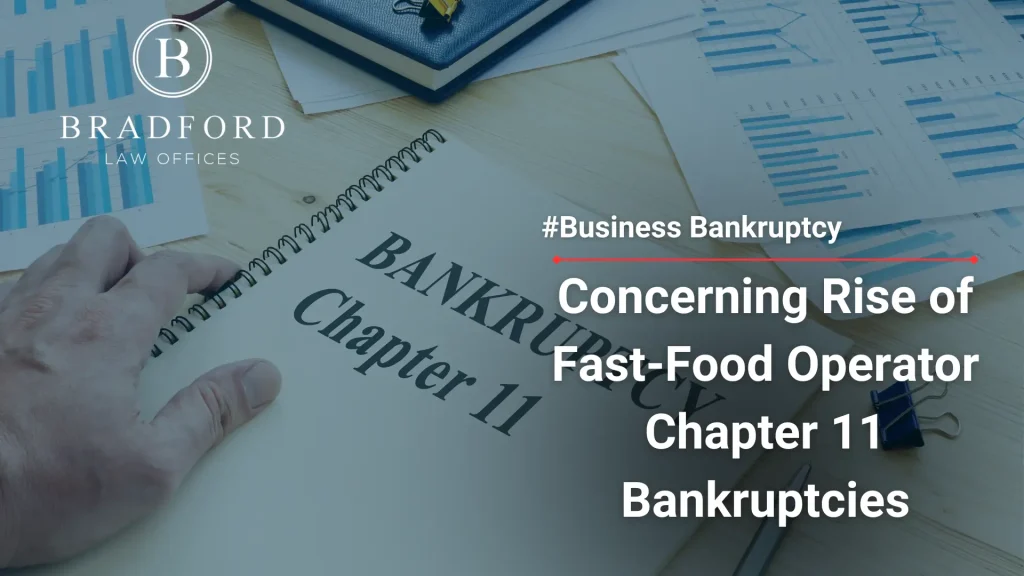Concerning Rise of Fast-Food Operator Chapter 11 Bankruptcies
Posted on Thursday, August 29th, 2024 at 10:59 pm

In recent years, the fast-food industry has witnessed a troubling trend: an increasing number of franchise operators filing for Chapter 11 bankruptcy. This surge in financial distress among once-thriving chains has raised eyebrows and concerns worldwide. Learn more about the fast-food operator Chapter 11 bankruptcy trend and what happens if a fast-food operator files for Chapter 11 bankruptcy.
A Perfect Storm: Factors Contributing to Fast Food Bankruptcies
Several factors have converged to create a challenging environment for fast food operators, pushing many to file for Chapter 11 bankruptcy:
- Rising Operational Costs: Food prices, labor expenses, and rent have all significantly increased in recent years, squeezing profit margins for fast-food operators.
- Changing Consumer Preferences: The shift toward healthier, fast-casual options has left traditional fast-food chains struggling to adapt and retain market share.
- Debt Burden: Many fast-food operators take on substantial debt to fund expansions or renovations, leaving them vulnerable when cash flows tighten.
- Increased Competition: The rise of food delivery apps and “ghost kitchens” has intensified competition in an already crowded market.
Understanding Chapter 11 Bankruptcy for Fast-Food Operators
It’s not necessarily the end of the road when a fast-food operator files for Chapter 11 bankruptcy. Chapter 11 allows businesses to reorganize their debts and operations while continuing to function. This process can provide a lifeline for struggling fast-food chains, giving them the breathing room they need to restructure and emerge even stronger.
Key aspects of Chapter 11 bankruptcy for fast food operators include:
- Automatic Stay: An automatic stay halts creditor collection efforts, giving the business time to develop a debt reorganization plan.
- Debtor-in-Possession (DIP) Status: In most Chapter 11 cases, the business functions as a DIP, meaning its current management stays in place and operates under court supervision.
- Debt Restructuring: During the Chapter 11 process, the operator can negotiate with creditors to reduce or modify their debt obligations.
- Lease Renegotiation: Chapter 11 allows for the renegotiation or termination of unfavorable leases.
- Continued Operations: The business can continue day-to-day operations during the bankruptcy process, maintaining cash flow and preserving brand value.
Recent High-Profile Fast Food Operator Bankruptcies
Several notable fast-food operators have filed for Chapter 11 bankruptcy in recent years:
- NPC International: As the largest franchisee of Pizza Hut and a major Wendy’s operator, NPC 2020 filed for bankruptcy and sent shockwaves through the industry.
- CraftWorks Holdings: The parent company of Logan’s Roadhouse and Old Chicago Pizza filed Chapter 11 in March 2020, citing the impact of the COVID-19 pandemic.
- Krystal: This Southern fast-food chain filed for Chapter 11 in January 2020, following years of declining sales and store closures.
These cases highlight the financial challenges facing even well-established brands in the fast-food sector.
The Road to Recovery: Strategies for Success Post-Bankruptcy
For fast food operators emerging from Chapter 11 bankruptcy, the focus shifts to implementing strategies for long-term success:
- Menu Innovation: Adapting to changing consumer preferences with healthier options and unique offerings
- Digital Transformation: Investing in mobile ordering, loyalty programs, and delivery partnerships to meet evolving customer expectations
- Streamlined Operations: Closing underperforming locations and optimizing supply chains to improve profitability
- Brand Revitalization: Refreshing marketing strategies and store designs to attract new customers and re-engage existing ones
- Debt Management: Maintaining a healthier balance sheet with more conservative debt levels to withstand future market fluctuations
The Role of Legal Representation in Navigating Chapter 11
Effectively pursuing Chapter 11 bankruptcy requires experienced legal guidance. At Bradford Law Offices, we understand the unique challenges the restaurant industry faces today and can provide tailored advice to maximize your chances of a successful reorganization under Chapter 11.
If you are considering Chapter 11 for your fast food business, we can help you by:
- Developing and presenting a viable reorganization plan
- Negotiating with creditors, landlords, and other stakeholders
- Ensuring compliance with bankruptcy court procedures and requirements
- Advising you on potential asset sales or business restructuring
Looking Ahead: The Future of Fast-Food Operators
 While the rise in Chapter 11 bankruptcies among fast-food operators is concerning, it’s important to remember that bankruptcy can be a tool for revitalization. Many fast-food chains have emerged from Chapter 11 leaner, more efficient, and better positioned for future success.
While the rise in Chapter 11 bankruptcies among fast-food operators is concerning, it’s important to remember that bankruptcy can be a tool for revitalization. Many fast-food chains have emerged from Chapter 11 leaner, more efficient, and better positioned for future success.
We expect further consolidation, innovation, and adaptation as the industry evolves. Struggling fast-food operators who successfully navigate the bankruptcy filling process and embrace changing consumer preferences are significantly more likely to thrive in the post-pandemic landscape.
For fast food operators facing financial difficulties, seeking timely legal advice can significantly improve their success. At Bradford Law Offices, we’re committed to helping businesses explore all available options and chart a path to financial stability.
Contact a Bankruptcy Lawyer Now
If you’re a fast-food operator considering bankruptcy or looking for guidance on debt restructuring, don’t hesitate to reach out. Our experienced team can help you through these challenging times. Contact us today at (919) 758-8879 to arrange an initial consultation with a Raleigh business bankruptcy lawyer. Let us take the first step toward financial recovery together.